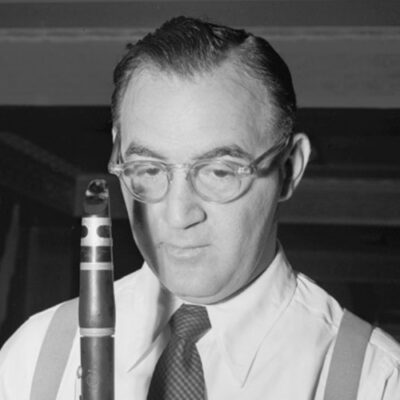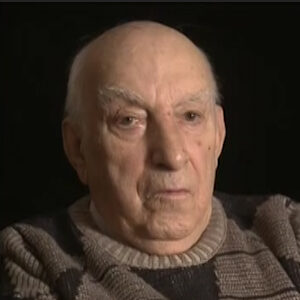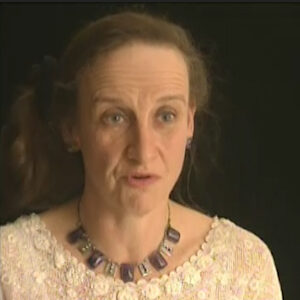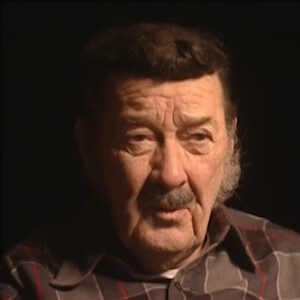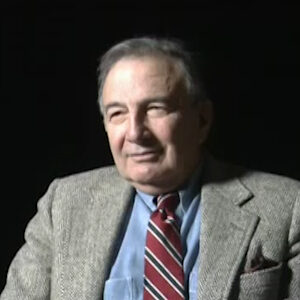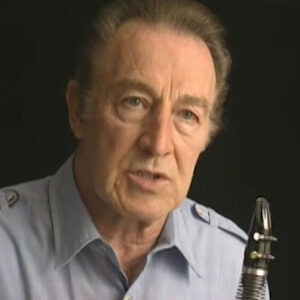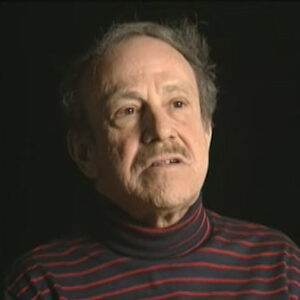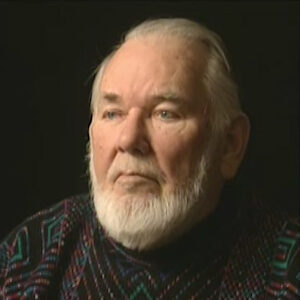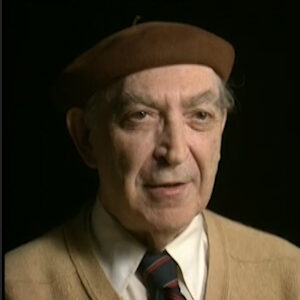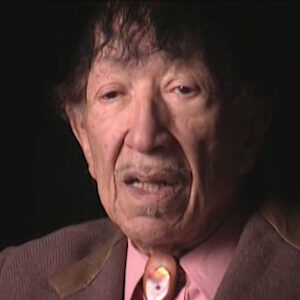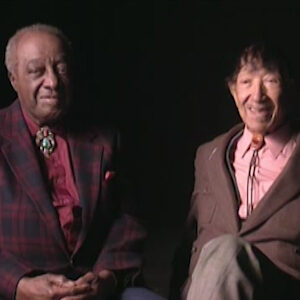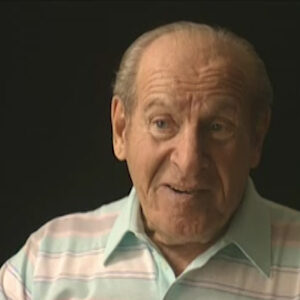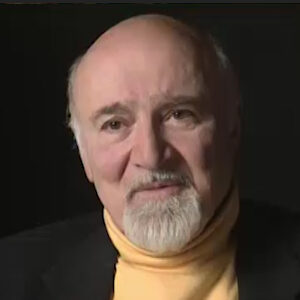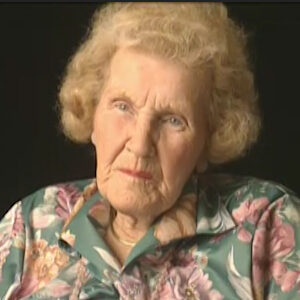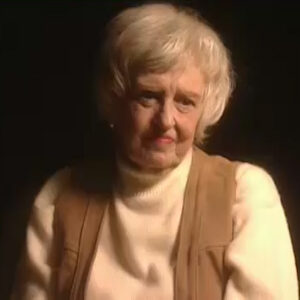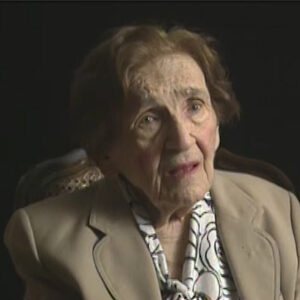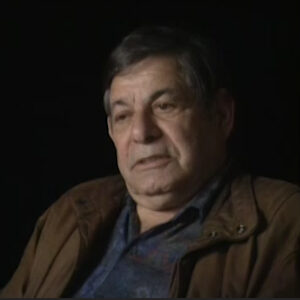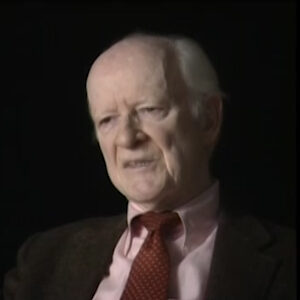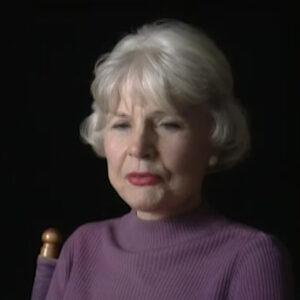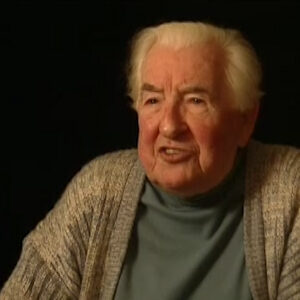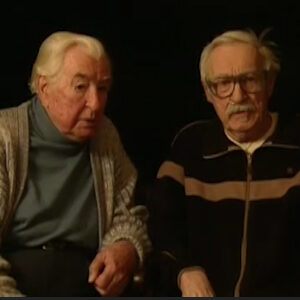Speaker As you looked out the window and saw the name, if there’s any way to tell anything about what it was like studying here and live with 50, 60 was like in the center of jazz in New York.
Speaker If there’s anything rising with Goodman, that’s great. But if not.
Speaker Well, when it when you speak of 50 Second Street, it reminds me of something Doug Severance had said recently in USA Today.
Speaker He mentioned. He mentioned he said the young people don’t know what they’re missing. And he wasn’t being cruel about it.
Speaker You know, the magic of you know, you never know when a renaissance exists. I mean, how it happens, why it happens. But there is a brotherhood of artists throughout the history of the world, whether it’s painting.
Speaker Any of the arts music? Somehow or other, sometimes it all gets together. And. As a youngster, I was so fortunate to be in many states, Mimi Spears studio, who is a wonderful coach. She taught Peggy Lee and Helen Okano and all the good band singers in those days.
Speaker And she lived in a brownstone right across the street from these awnings that said, George Shearing, Billie Holiday.
Speaker Lester Young, big, said Catlett, Eric Garner. Hip hop playing in a small dead, maybe three little buildings and little clubs. And he went from one club to the other. And in those days when you had a jam session.
Speaker He stayed there and it was so infectious and so interesting, everybody stayed up and you’d get out at the end of the jam session and walk out into the street and it was 12:00 noon.
Speaker You stayed there all night and listened to These Are Tatum, there’s famous stories about Art Tatum, the greatest piano player that ever lived in jazz. And to a Rubinstein. And, you know, the greatest classical pianist would come and all of the musicians would come, the piano players after the club closed to just listen. Art Tatum. Vladimir Horowitz in to a Rubinstein and. And all the great Terry Wilson and Citizen, all these great, great piano players used to come in and just sit in a door. There’s a famous story about Fats Waller. He was playing the piano one night and Art Tatum came in and he stopped playing. He said, excuse me, said God just walked in the room. And that’s that’s how much they loved Tatum.
Speaker You spoke about your enthusiasm for jazz in those years and mentioned Krupa. And Goodman has been people that you responded. You remember hearing them together during one of those on the radio you would have first heard?
Speaker I used to see them at the Paramount Theater. And I don’t my recall isn’t that good.
Speaker Unfortunately, I wish it was, but I’ll never forget. Krupa. You know, when it came out of jail. That’s the greatest moment I ever saw in show business, you know, and the people that the stage would come up just rise up, you see at the end at the end of that film, and all of a sudden here comes the stage show. And there was Gene Krupa coming back. And it’s the longest ovation, single ovation I ever heard in my life. It had to last at least two minutes before anything could happen. They would not allow anything to happen. They just the people applauded for two solid minutes.
Speaker You know the story about that one, I guess, you know, he’d been busted. Nobody would hire me for old time’s sake.
Speaker He gave his blood back, although they aren’t part of the best of times.
Speaker I guess that was the first thing that’s so fascinating, because to me, the social side of Benny shows what a. A tremendous, tremendous human history was, you know, the fact that he had the first interracial group on stage, that that was unheard of in those days. Unheard of. You just you weren’t allowed to do that.
Speaker And his greatest concert was with Lionel Hampton. And slammed Stuart. Terry Wilson and Benny Goodman, Gene Krupa. It is know black and white playing on a Carnegie Hall stage. It never happened, in fact, in those days.
Speaker They didn’t even allow jazz in Carnegie Hall. It was all strictly classical music. So it was a major, major. A change in social life. Very, very contributing.
Speaker You you grew up in I guess the big bands were really the main pop music then you were a kid, you remember sort of what that atmosphere wasn’t and how it changed when vocalists just. Well, you know, was it something was it that the business changed or musical tastes changed?
Speaker Well, you know, it’s your experience. It’s never one thing. You know, the word change that. By the time, you know, everybody went to war, SEC. The Second World War. So when they came back, inflation set in. It was an economically feasible to hire a whole band on a weekly basis. It was very, very expensive. Before that, it wasn’t that expensive.
Speaker Plus, the fact that. I think I may I may be wrong, but I think everybody was influenced by Lester Young. When he took fifteen courses on the tune and each course was interesting. And I think ever since then, musicians think they could do the same thing, they didn’t realize the genius of Lester Young. So they do it now and they insist that you shouldn’t dance to it like they want you to listen to them. But I think that was a wrong move because I think you could dance and listen at the same time.
Speaker I mean, Claude Thornhill with Gil Evans Orchestra and David Allen singing. Very, very creative.
Speaker People came up with some very, very great music and you could still dance to it and listen to it. And it was very creative. And I just think it’s I think it took a wrong turn. People want to dance. You must service the public. There’s nothing wrong with servicing the public. They want to go out. They want to dance, you know. But musicians say, no, I want them to hear me. Well, they’re gonna. You could dance and still listen. And it’s it’s done in an art form. It’s still, you know, just so many bars while people dance to it.
Speaker You remember what your experience was like as a vocalist with a big band, having dancers there, venues. And we have we get we said I really didn’t like playing concerts because it wasn’t the same as when you were. That’s right.
Speaker I heard bases say that. I heard Campisi tell me that you hear them. He’s who is he? And I were watching his band rehearse one time out at Westbury in Long Island. And he was listening to the band and he was listening to what they were doing. And he was always very understated and humorous at the same time, he just. He was very quiet most of the time, Emily. He just turned around. He says that people want to dance. That’s how he put it.
Speaker One unusual thing about I’ve heard about the interview experience is that everyone in front of. He thought that he would actually single lyrics of the songs to himself to get the beat. That was right for dancers and I’m sure that’s great.
Speaker I heard that Tommy Dorsey did the same thing. That’s very correct. You know, it gives you a premise if you have a good song. Let’s say you have a song like Victor Herbert in the summer. The wonderful words. The words will inspire a musician to play it a certain way. The musician will give it a concept. If they really like the words, you know, their words, an Indian summer, absolutely adorable. They’re very poetic.
Speaker You know, a lot of people don’t realize that. The early composers. The lyric. Right. It’s like Yip Harburg and IRA Gershwin. They studied classical poetry. They they knew what they were doing, they had a lot of schooling. Excuse me. They had a lot of schooling, see, because. But they did it almost in a like the Japanese haiku poetry. They did it in 32 bars.
Speaker They would tell a poem, a story in 32 bars instead of sometimes instead of reading a whole novel. It goes on for hundreds of pages. You could say the same story in 32 bars.
Speaker As as, uh, as an instrumentalist, did you was anything special about Benis playing in terms of being concise like that, of being able to be one thing that comes to mind as several people have? Mentioned you and Betty in the same breath. Is having a kind of elegance and, you know, great taste about you.
Speaker Well, isn’t that what safe thing? Never. That connection ever occurred. That’s fantastic. I never heard that. Ministers like my questions won’t be there. I don’t think so. If ever you wanted to take off. And so I said just started. I understand. Excuse me. Just sir, please.
Speaker I understand what you said.
Speaker I think a lot of musicians were jealous of of Benny Goodman. You know, I mean, he really practiced. I mean, how do you get to Carnegie Hall practice? What is the old expression? But, you know, there are legends about him practicing eight hours a day. He can’t play classical music. He was able to. And he was really the pied piper of that time. He was a. Had the greatest musicians with them. I adored the late Bobby Hackett. Whoo hoo!
Speaker Love playing with Benny and then my dad. That’s where you and Bobby Hackett.
Speaker If that conversation about anything that you felt to me about Bobby’s playing.
Speaker Oh, Bobby. He was the first guitar player for Glenn Miller.
Speaker And that’s why he knew all the chords and he knew all the. And he understood the music is he knew the harmonies. And so that’s why he played and chose such beautiful melodies.
Speaker When he improvised. It’s like Louis Armstrong. Says. He says on the Coffey’s. But is the cream?
Speaker You mentioned the importance of his taste in musicians. Is that tell it a little bit, but about your also, you know that attentiveness to who you perform with picking the guys who are.
Speaker In your case, yeah. I love, I love.
Speaker The more mature kind of jazz musicians, I just love them, the ones that are dedicated. The ones that have. That the integrity out front before the salary. The ones that just want to play good music are the ones that I respect the most. I mean, they’re real. What are they, Sanju, as they’re manses? You know, they’re they’re really tremendous people. Tremendous. You know, because they they didn’t sell out. They don’t take a dive. They play real music. It’s from the heart. It’s from the head. And they’re very romantic to a lot of people don’t realize there’s always. Well, you know, musicians, you know, they always they tell jokes like they’re on TV a lot. But it’s it’s it’s a very big added thing about them.
Speaker The real good ones, I find, are exceptional human beings that thinks they are romanticists.
Speaker Were, critics might say things are too sentimental these days. You know, they stay sentimentalists, they go past the review as they keep. There’s a brotherhood, you know, and they they paint from the heart. So they not only paint, they they paint with their music. And recently, my piano player who’s been with me twenty five years, Ralph Sharon, who found all my songs for me, and he and I are closer than brothers. I mean, he’s just like this. He knows me like the back of his hand. But he took ill and Bobby Tucker filled in. And Bobby Tucker has only played for three singers in his lifetime. No one was Billie Holiday and then Billy Eckstine and Billy heard about. The fact that Ralph took sick. And he he mentioned to Bobby Tucker said, jump on board with Tony and play. And the joy I’m having. Being around Bobby Tucker, who is just so sincere and careful and and poetic about the way he plays.
Speaker But these are real artists, some of whom you just missed, that she was here an hour ago with another piano player who you share with Benny actually went right from playing with John Bonham.
Speaker Oh, I love John. Hi, gentlemen. Zambonis night. I love them. No, I’ve I’ve been very fortunate. I’ve had very good. Tell me, Flanagan had John Burns, Terry Zito, very good musicians when they all the time and they they make it happen, then they know just what to do. We spent three years, John Burns and I spent three years in England together with the great Robert Farnham, who was the finest orchestrator of music in the world. And we did a TV show for the BBC. That was was some experience. Now, John is a very special person, the.
Speaker He spoke a little bit about a company, about, you know, playing with you and playing with them. He said it’s what helps if you get someone inspiring that you’re playing with. But it’s a real there’s that give and take, which is something it strikes me.
Speaker You know, it’s interesting that you say that for years I know companies very underrated because to be able give yourself over to someone else and make them look like Count Basie. He was he was a great accompanist. I mean, all these musicians started walking around thinking that they were great, but he was making them sound great. He just knew what to play. He played. You know, very little. But when he played it, it was in the right place. So then anybody who played to sound of wonderful playing with Campisi.
Speaker And yeah, it’s a noise you. Amy, this is a question. Sure. Excuse me a second.
Speaker I have another one when you get a chance. Thanks.
Speaker I’m not sure that if you want to take take this one on this case, you mentioned the role of that Abedi opening up just in terms of race. Blacks. And it’s also something that I’ve always loved about your music. As you played, you sang with Basey and I think of.
Speaker Opening up jazz is an interracial thing that it doesn’t matter in some sense, it doesn’t matter, and it is. In a profound way, African-American and some of its origins and.
Speaker Benny.
Speaker I’m saying it will be difficult for you to ask it, but if I could make the question clear. Brenda. He I feel that some way he suffers in the public view that he was a white jazz musician. And I wonder is again, being a white performer in jazz and you’re sticking to her saying, well, this is something it shouldn’t be.
Speaker Anybody can play that that’s very bigoted remark and say I win.
Speaker I mean, if the blacks think they invented jazz, they might have invented jazz. And that’s great, you know, that they did that because it’s America’s really only America’s true contribution to me. The Grammys, the top 40 is the billboard charts. Jazz should be first because it’s really our tradition. And what was a country left with after it after it stops being an empire? It’s what did we contribute to the rest of the world? What was it that we contributed? Well, in our case, we contributed Duke Ellington. You know, it’s you know, truthfully, if we were just thinking, not money wise. We would put the money on the greatest jazz artists.
Speaker They should be number one, two, three in the top 10 every week because then the standard would be a more mature. That’s what I love about Benny Goodman. What he created was a much more mature kind of popular music. He never he never did a silly little novelty song that would be popular for six weeks or something and then fade out. You could listen to a Benny Goodman record right now. Any young person, whatever your age is.
Speaker It will not sound dated. It was done with care quality. The recording of it was masterful engineering.
Speaker Great musicians, you know, a production to this, whatever they were planned. I mean, who will ever forget the great Gene Krupa gone?
Speaker Bum, bum, bum, bum, bum, bum, bum, bum, bum, bum, bum, bum, bum, bum, bum.
Speaker That’s the most hypnotic thing I ever heard in my life. You just can’t wait for sing, sing, sing. You know, it’s just one of the great records of all time. You never get tired of listening to it. It’s always good. It’ll always be good. 200 years from now, it’s going to be good. So this is a black and White House. It’s kind of silly. You know, it’s it’s bigger that you have to look for human beings. You say you can’t you can’t say this guy’s black, so therefore he’s better than someone who’s white. I mean, that’s. You know this, Corney, people on this side in this country, people, and that’s had this brilliant people on this side. Brilliant people on this side, you have to look for the individual. What is he contributing?
Speaker And says about him. And it was myself again. It didn’t matter whether they were black or white. He was hiring. He just was just. You heard the sound good. You wanted to play.
Speaker Thanks.
Speaker I know a lot of people don’t look at them because they’re not featured in. They’re not in the headlines. You know, it’s not like Harry James or Benny Goodman is that this is they’re playing and making somebody else look good. I think what a wonderful quality that is in a human being is it is real. There really are artists to give themselves over to someone else.
Speaker You’re beginning to tell about Wild.
Speaker Well, Alec, well, when I met him years later, after I studied, I’m I’m Fifty Second Street with Amy Spear. And it wasn’t until 30 years later we became very good friends and. And. A severe and the when you first met me and I said no, I said you seem to just have arrived and then we just. He said, I used to be in the closet listening to you when you were a student with many Speir. I didn’t even know it. I didn’t know who he was. I just he probably came by one I heard a sound like. But he knew me when I was a student.
Speaker We talk a bit about how you got to know, Benny. You need a funny story.
Speaker Yeah, Bobby Hackett introduced me to Benny. He took me up to his home and we spent the whole day at Benny’s house. And then he was playing, practicing. I was fascinated, listened to and, you know, the late Bing Crosby said to Jay Kanada, drummer who was with him on his last tour, said, nobody uses a microphone like Tony Bennett. And I was thrilled with that. But I it makes me realize that that afternoon we did a benefit concert up there somehow with with Benny. And I was working with the microphone. And he said, don’t get too close to the microphone. And it threw me you know, you get stoic with the way you work, and I if you’re here, then you don’t want to do it. You don’t want somebody say polder over here, you know? So I had, you know. Took his advice, and to this day, he really taught me how to use a microphone. It just sounds nicer when it’s when you’re just a little away from the microphone right into the mike. That kind of gets a muddy sound when you get right and close to a make a case like that, you know? And as you step away or the Senate comes clearer and it’s true. A sound. So it was invaluable experience.
Speaker I guess he was recording one might hang it in his room.
Speaker He’s right. I mean, the business of these people putting the new engineers put blocks, you know, from the piano to the drums to the bass or whoever, you know, they put these big walls up, the separation from multi-track. But the whole premise of musicians is getting together, not separating them. It’s just the opposite. So, in fact, there’s a famous story about Eugene Ormandy, the great classical conductor from Philadelphia. And he would set the knobs the way he liked the sound and they would tell the engineer in the glass booth to cross his arms like this. And as he was conducting, he would just turn around quick to see if he was safe and make sure he didn’t touch the knob. They want to conduct a lot of engineers want to conduct. And say, well, that that’s too loud. Let’s bring it down. This is to happen. Let’s bring this. And, you know, it has nothing to do with music.
Speaker Is is a thing called proper involvement. How do we all get along? We all make this blend. And it’s that marriage that makes it a miracle happen. I did the Royal Albert Hall, the 100th anniversary Royal Albert Hall with Robert Fine and then John Bunch. And Yvonne Littlewood was the directors and she put one microphone over 109, nine men, and we did a BBC television show that way. The sound is beautiful.
Speaker Yes. Still represent my mother.
Speaker And I had mentioned it earlier. I never saw a film like that in my life on a musical. A case in. Whoever that photographer was, you know, he is just an artist, the way he he captured the whole spirit of what Benny Goodman was really all about, just in that he was described, again, the images that stick. Well, I love the way he had the feet tapping, you know, and then. And then. And then people just wanted to get up at the very conservative and they they wanted to really get up and dance in the aisles. They just took off. You know, this wonderful group, you know, they’re just special special artists. You know that. And the thing is, fortunately, we have film. We have recordings. So these people don’t die. They just live on forever.
Speaker You mentioned before being in the Paramount Theater, those people actually did get up out of the chair.
Speaker Well, I didn’t see it personally, but I sure heard about it. And Benny Goodman was the first one to have that happen. It just got so hot that everybody just got in the house and started dancing. And of course, I live in those days. I lived in Astoria. So you just heard all the gossip or whatever was happening in the music world. Oh, yes. And I said, God, Benny Goodman got everybody dancing in the aisles. That was unheard of. No one ever did that before. Was the first time ever anybody ever did that?
Speaker Everyone’s favorite. You write great. Record. Do you remember when Sinatra performed at the Paramount with Benny, which I guess was the first time when the everybody went crazy for this boy singer who suddenly the main attraction that. He described that anything good or if there’s anything else that you would relate to, Michael.
Speaker Well, once again, I. I’ve heard of that happening to senator and some great photos. You know, there was a he had this. I think Evans was his publicity man who is a very creative publicity man. And I heard stories from Buddy Rich, the late Buddy Rich. There was a little.
Speaker Record shop next to the Perama as a small, only 75 people could get in the shop. It was a small little record shop. But Evans was smart enough to tell. So Natcher and Buddy Rich. After each show, there were seven shows a day and hostess his. How inhuman that is that they. He told them to go into that little record shop and just look at the records. But there were so many fans that adored Senator.
Speaker The streets were like New Year’s Eve. There were just that many people in the streets. You know, we have to start get some growth.
Speaker But no, you had a very strong reaction that was changed in his career to what you saw a sense of that time was very personal terms, what it was. You know, when you got out of the army, the war was over.
Speaker Well, automatically it was different. OK, thanks. Thank you.
Speaker That’s OK. We’ve been getting.
Speaker Well, because of many reasons like that, there was a big musicians strike that lasted too long.
Speaker Economically, it wasn’t feasible for a ban to carry on.
Speaker The clubs, all the segments that have big ballrooms. They went to small little bistros, all of those days are the Blue Angel and.
Speaker And the Bon Soir down a village in the Bovard Hotel where they would have two pianos instead of a big band and.
Speaker And were all small. Combinations of size and small combos started becoming popular.
Speaker The only two bands that survived right to the day they died were Duke Ellington and Count Basie. They kept doing big business.
Speaker When you say yes in the 50s.
Speaker Yeah, but I came up because of my age and Benny was like 10 years my elder. So I was a big fan of Benny and all that and the whole band business. And in those days, the public knew every sidemen. They knew all the musicians. And Ziggy Elmina trumpet. You know, with Tommy Dorsey and the Pied Piper and Joe Stafford and Buddy Rich, they knew every every and each band. They knew every every guy, not just the leaders. Today is different.
Speaker That is the what happened with Bob talk about what you’re about.
Speaker You know, once every 500 years. Some genius comes along and changes the history of music. And they created a new style of music and it created an opera. You know, Louis Armstrong didn’t like it.
Speaker Benny Goodman didn’t like it, but it’s it’s fantastic. I mean, with Dizzy Gillespie and Charlie Parker did in those days, they created a whole new form of music that was never there before. So they were geniuses and it influenced many musicians. You mentioned John Burns. He adores Bob. And many great musicians that I know. And I’m really a Bob singer. I can’t believe, you know, I’m very popular. Thank God. You know, I have become an entertainer, but I really started out as a pop singer because in those days, they were enticing as they felt. Singers hurt the band business because singers have words. So you communicated that much more. You tell good stories with the songs. I’ll be seeing you. You know, Cathedral bells tolling, hearts sang on. Was this the spell at Paris or the April Dawn Hypnotizes? People hear a story so singers have an edge because they have words to deal with, not just music.
Speaker And a lot of musicians felt it. They ruined our racket. You know, we can’t sing. Everybody likes singers now.
Speaker So it’s a VEBER players didn’t like singers. I was so fortunate because of maybe my upbringing. Fifty Second Street and studying there. The big bar players like my singing. They allowed me to sing with them. I didn’t. I didn’t even know. I live in a star. I lived in Astoria. So how cold. But Shanks and Zoot Sims. They would come and just do gigs out there. And I used to get a Terry Glenn was the first one to get me up on the stage. He could sing with us. And I didn’t know I didn’t know who they were. And then now, looking back with their musical history of these guys.
Speaker Yeah.
Speaker Yeah, that’s true.
Speaker Yeah. Actually, I went to see heard about Charlie Parker, so I went to Birdland and. And I was this close close to them. We are right now. I was very close. I was right up close to him on the stage. They put him right in the first seat and he just put his his saxophone on. Right. Right up my nose. And it was so intense that I just I couldn’t believe the music I heard. And I just ran upstairs in the street and threw up out in the street. I couldn’t believe have I never heard that kind of music before.
Speaker Well, in those days, you see, everybody played sweet and it was a long line. Singers sang with long lines. It wasn’t that didn’t have that, you know, that intensity in a way, is it? Wow. This is your faith. This is some real soul. There was a lot of soul when be. But people forget, you know, they think this is perhaps nothing but a lot of notes. But there were there was a lot of soul and good. The good performance of the great people. Players who played the blues know that. I just still I still adore it. And I listen to him. I just can’t believe how beautifully he played.
Speaker Any of the singers associated with any, particularly for either Helen Ward, it was early vocalist or Peggy Lee Rhiannon, are male singers were not his bag. Well, he did. I guess he did like your thing.
Speaker Oh, yes. Naturally, him appearing with him. So that’s pretty good company. That must have been one hell of a show. I wish I had seen it. Peggy is is adorable. She. She’s a real artiste, you know. Have watched through the years, and she does everything with great care and. Always comes up with new concepts that she’s a wonderful composer. She knows how to write songs.
Speaker That’s a wonderful refrain. Going through some of the things you said about care. I mean, people don’t think this about music.
Speaker I know. I don’t get it. Is that it?
Speaker You seem to think that beneath it, especially in the religion. Oh, he was an awful band leader. He was awful.
Speaker He was so particular about music. You have to.
Speaker Well, you got to leave a scene. Who is the president of Columbia Records? You know, he said, you sell me a nice guy and I say, you’re a bad leader. You have to be tough and get everybody together. Maybe not. Maybe this maybe that there’s a genius somewhere. I could still be a nice man and make it all work every once in a while. There is.
Speaker But to get everybody to get it, you have to really be strict about it. Toscanini had a terrible reputation, but everybody musicians still appreciated him so much. They knew that he knew what he was talking about. So so there’s that. You know, the.
Speaker Did you ever experience it with Bay when you were born?
Speaker Yeah, I did once. And it’s really funny. I tell you, you know, you never know. You could say something that’s absolutely stupid and you get embarrassed and read and everything. But a solid base in St East, you had this big band and the band was swinging. It was swinging. And, you know, he’s known as the King of Swing. That was his, you know. So he’s standing next to me. I said, boy, I said, there’s that swing. And the look he gave me for saying, let’s just to this day, I’m embarrassed that I haven’t said it to. It is funny.
Speaker It’s look like he was thinking something else.
Speaker Yeah.
Speaker Like, you know, he was just like, you know, where it is, is it’s under the heading of jealousy. I’ll be honest with you, you know, because he became a monument and a lot of great musicians never became that famous. So you have stories about Benny because they didn’t make it and he did.
Speaker There’s a lot of that, you know. Oh, really?
Speaker You know, you remind I don’t mean to interrupt you, but there’s a funny story one time. I know I’m a musician. I don’t think I should mention his name.
Speaker It’s a funny story to start again without a musician.
Speaker There’s a musician that I know. You know that. Was play. He was a real big bat piano player. I was just the beginning of BOP and he so he Benny Goodman hired is a good player, very good player. And and when Benny gave him that famous ray that he gives musicians get stung. He stuck his tongue out. Then you understand that.
Speaker Meaning you want to a good story about polygamy. The a famous story. I might tell it a little different than the way it really happened, but they were all in the car. And he was he was niggled by the fact that somebody wanted to raise.
Speaker And they’re driving down this highway and it’s a wet day. And they say. But why? Why should the guy. Why did he want extra money? I mean, I’m giving him enough money. And as he said that the car slipped off the road just in the rain and it tumbled over everybody. It crashed crest in a ditch, and he gets out and everybody’s wondering if everybody is OK. And he just said. He said, I still don’t understand why this guy should ask for more money.
Speaker I have to know that there are four or five people telling that story or the same story.
Speaker They were there. You want to hear a real segment. You want to hear. Good. Benny Goodman, sick one. Tell you a sick one.
Speaker This is a recent, very recent guy goes to an agent. And he says, I want I want it goes to Willa Alexander’s office and he says, I want a band for my wedding.
Speaker He says, I want Benny Goodman.
Speaker He said, you know, it’s funny, said Benny Goodman, hasn’t it is his will that you’re not allowed to have a Benny Goodman alumni. You can only add. We do have Campisi. We have Woody Herman. We have a Duke Ellington band. We have all these different bands, he said. But we don’t have a P. Can’t give you a. But I want Benny Goodman.
Speaker So he said, well, there’s a contract that says you’re not allowed to use his name. He says, I know, but. But we have Woody Herman. We have company. We have Stan Kenton. He say whatever you want. We got to give you a big name. Guys, I want Benny Goodman. He said he said Benny Goodman is dead. He says, I know it’s Jews, but I just want to hear it.
Speaker That’s a sick joke.
Speaker Is worse. That is worse. Oh, my God. It’s a good thing I forget who it was.
Speaker Just days. Oh, the day that he died.
Speaker He said, I’ve got. Two things today.
Speaker I want to get this straight here, good news. You see the bad news first, he says Benny Goodman.
Speaker Here’s the good news.
Speaker Here’s the bad news, here’s the bad news. Bad news. Yeah. Oh, boy, he didn’t feel a thing.
Speaker The one the one that told me that, you know, somebody in your closet who died today is the bad one.
Speaker The one I like was Zoot Sims, who is one of the most humorless men I’ve ever met in my life is this fantastic guy. I loved him so much.
Speaker And I said, what are these stories about Benny Goodman? I said, what is this? Everybody is knocking Benny Goodman. He says, I don’t know why. He says he’s always nice to me. Tell me. So he says he treats me great. So I go. I play the game tonight. Is it. It’s fine. There’s nothing wrong. So maybe feel good to say like it is. So about six months later, I said, has Benny? He said, well, he says, we’re not getting along. I said, Why? He said, Well, I took a solo and it got so much applause. He took the solo out. He didn’t allow me. Says ever since then, I married him now.
Speaker So they go on and on. But it still can’t. Eliminate the great music that are on recordings and on film. You know that they’re wonderful performances. They’re dead. The next generation, the next generation, I know you’ll never be forgotten.
Speaker We talked about the toughness.
Speaker You’re also thing about about choosing songs, choosing material that we relate to in the cameras, I think, is that you actually gave up recording for us because it’s not worth doing it if you can’t get the material. I get that sense with Benny after words like he would perform if he could perform with good people that he liked. And play material that mattered.
Speaker So musicians, you know, well, you see it, you know, it took me all this time, I’m 66 years old now and I didn’t really know quite what I was just going on. Instinct and. Feelings, but. And I realize I’d like I’d rather have a hit catalog rather than a hit record. And I think Bernie thinks that way. And any good artist thinks that way. I mean, everybody you know, it’s such a. Ineptness about where an artist is really at as much as his love. Fred Astaire. Everybody says, well, he can’t sing now. His repertoire. The songs that he’s given the world. I mean, you know, Irving Berlin, Gershwin, Jerome Kern. They wouldn’t do a song unless he introduced it. So you have you know, they can’t take that away from me. Cheek to cheek.
Speaker And it goes on and on a foggy day and in all these magnificent songs that everybody sings, everybody does them and they couldn’t be better. And those are the songs, One for My Baby. You know, it was introduced by Fred Astaire, all these great songs.
Speaker So it’s the selectivity of the repertoire that determines the quality of the artist who is just what he selects, what he decides. His genius, Astaire’s genius, was knowing what not to do.
Speaker It’s so incredibly thick. I’ve also been knocking upstairs this thing and my crazy like three records that I listened to over and over and over again. You’re singing with Daisy.
Speaker I love all your stuff in Stafford. So not just stop and think. And Fred Astaire playing with Roman Grant. Oh, that was beautiful. Really? No. And.
Speaker And Benny was that way, you see, Benny. This was very selective about the musicians that he played with, the songs that he chose. He didn’t cheat the audience yet.
Speaker What I dislike is Madison Avenue is out of touch with the public. They they think you have to play to a 14 year old level to communicate. You’ve got to be very commercial. They’ll tell you that right away. If you want to make it, you have to be very commercial. So you make money, so you’re popular for about a year and a half. But then what happens after that? Yeah, everybody else makes money, you know? And then they go on to the next overdog. But for an artist to sustain just like a Johnny Carson on television, it was always quality. You know, he always wore a tie. You always had a great big band. The best musicians in America. And he clowned around, he made fun of you, but at the end of the interview, he made everybody look good. He never really insulted anybody ever all the time he was on. So what is it? It’s this care that creates the longevity during Benny Goodman? S life. He was on top.
Speaker What what better testament is that for someone in their lifetime to be known as someone who never really went down there, just stayed right up there, stayed a certain level because he knew what he was doing? It’s like this like Nat King Cole is. He’s such a musician. Every time he made a record, it went to number one because he was a musician. He knew just what the public wanted to jump back to.
Speaker You made a joke about.
Speaker Are you embarrassed about your comment about swimming? Let’s talk about swimming. I mean, it’s what you’re singing. It swings. Can you it can be a hard thing. And the problem is, what is when is it jazz? What in your mind, what is the swing and what is the best venue that made it swing? Give me one second chance.
Speaker OK. A day. We won’t keep it too much like you being.
Speaker I have. OK.
Speaker What a swing. Swing is light. It’s not heavy. Know it’s not it’s not a Rolling Stone. It’s not cacophonous.
Speaker It’s not we can’t you know, you have to close your ears because it’s too loud. It hurts your eardrums. The famous story about Joe Jones, the great drummer with Duke Ellington at Newport. It’s on the liner notes of the album at Newport. It’s a fantastic album. And he took a newspaper and rolled it up in the wings. He wasn’t even on stage and just kept time on his knee with a piece of newspaper. And that newspaper created one of the greatest performances that you could ever hear any band ever play. It was at Newport. Duke Ellington at Newport. You could the records around, you could buy it if you if you looked for it. And you’ll get one of the greatest thrills in your life, you’ll hear Paul Gonzalez taken 16 choruses and. Duke with all those wonderful musicians, but it was Joe Jones with just the newspaper rolling it up and playing it soft, hip and time soft pedestal dancers soft.
Speaker All the great drummers knew how to play in a caring way. It’s it’s not how loud you play. So that’s the separation between this, a rock and swing. It takes off. It’s so funny, it flies. It’s American.
Speaker I’m not even a flag-Waving now, but I happen to like being an American performer because I think American performers are the best performers in the world. Not that there aren’t good performers everywhere in the world. But there’s something about us that maybe it’s the fact that we’re not a tribe. Maybe it’s the fact that we’re not a philosophy. We’re all different philosophies. We’re all different religions. We’re all different people, you know. So maybe it’s this get together that makes us the most advanced ahead of time. Country in the world. Because if the world doesn’t get together. It’s not going to work. So sooner or later, everybody has to get together and the United States has this. We have so many stars. And the United States. That it’s almost as as many as the universe. Whereas, you know, if you ask about who’s the biggest star in Japan, I think would be. You know, you say, I don’t know. You know, India, you know, even though they have vast audiences for their films and everything, we still don’t know Internet. They don’t. There’s no Clark Gable in India for real, 59 interview with Tony Bennett.
Speaker Well, you know, when I first started, I got often nervous and I went.
Speaker On a dare to see Sinatra backstage. I had never met Sinatra. But I had the one I was the Michael Jackson of my day. I had one, five, seven and 10 record on the Billboard charts. But I was a nervous wreck. I didn’t know what to do. So I said, let me just take a shot. I’m going to go see Sinatra backstage. He was had a reunion with Tommy Dorsey at the Paramount. And I found out that it was very nice to me. He welcomed me and said that with me.
Speaker And his philosophy. Stemmed from what happened to Benny Goodman when he first started. He said, just come up with something. He said, producers will follow you. They’ll find you. Said, make something up.
Speaker Do it with care. You know, do it with quality, but come up with something. And then sure enough, somebody will just say, hey, we’d like you to play for us. We’d like you to make a record or we’d like you to do a film. And to this day, I still use that philosophy. But. I wish that we would return all businesses in America not to the music business, not only the music business. Every business. When I grew up, everything was made very well. Obsolescence was an unknown word. It’s what Norman Mailer calls American insanity, a guy takes a couple of years to buy a car and the door comes off in his hand and two months he goes crazy. So so it’s almost like we become a country of con artists. We think it’s cute to be a con artist than to do something well. If you do something with integrity and then you make money, you’re very satisfied. You hit that pillow at night, say, at least I did it my way. Now, Benny grew up in that wonderful period when he was 26 years old. He became the Kingsway. He made people dance in the aisles and it never happened before. There was never a phenomena like that. Soon everybody got up and started dancing in the aisles. So it became like this whole cult thing. You know, big giant fan clubs.
Speaker But he did it with quality. So at least he said, at least I did it. I’m given some. And I’m not just making money. I don’t want to cancel or two years from now in Spain and I don’t want to retire, which is that now. Ever since the advent of the Beatles, the whole philosophy with every rock group is going to be so big and I’ll be bigger than the Beatles in two years. I’ll have to have a castle like Paul McCartney has in Scotland, and I could never have to work again. That’s not life. Life is not George Burns his life. Surviving. You know, we all all of us were born, we live and we die. Nobody’s beaten it. Nobody’s ever beaten it. So to think that you’re going to just be forever. Is incorrect thinking you have to just know that the whole thing is preplanning so that you just accept yourself whatever age you’re at. To the world. And if you have integrity. I wish all businesses would go back to doing everything with quality. The whole world would come around. Well, it was a time when the whole world. Owed us money because we did everything so well, now everybody will, we’ll everybody else money that’s out. That’s how bright we are. We’re walking around like a schizophrenic. I mean, because we’re walking around like everything’s great. And we all we all four trillion dollars something not really. Right. So we have to get back to doing things with quality. That’s what’s so great about Sinatra, you know. And Nat Cole and Benny Goodman and all the great bands, you know, like Woody Herman and Count Basie. The thing that they had going on is that they did everything very well and that’s why they survived.
Speaker Okay. Thank you so much. Okay.
Speaker You know, the one thing nice about being a student of art, you know, you study the history of art. And Leonardo Da Vinci. A lot of people don’t know it, but he was the best singer of his day. He was the best musician of his day. And everything else, the best scientists, et cetera, et cetera. He just knew how to do everything. He was put here on Earth to keep us all very humble to who we were.
Speaker And.
Speaker There is no record except other colleagues of his that said that he knew how to write music and read music. But there’s no record of it anywhere. And then he found out that he would write sonnets and poetry and everything he ever did was improvised. Every time we perform the improvised that’s back in the 15th century, you know, 14, 83. Around that time. And so. Improvisation is not new. Great classical composers, Bach. There are plenty of times that classical musicians can tell you that they leave things open for certain individual soloists to play whatever they feel here, that they don’t have to follow the notes. It’s not just bad, but other composed great composers allowed individual performers to take solos throughout their compositions. So improvisation is not a new thing. It’s been around for centuries. Now what they did. They extended. The from New Orleans. They extended that improvisation and made it lengthy. That’s the that’s the true contribution of it. And it was a very clever thing to do when you say.
Speaker What do we look forward to?
Speaker Yeah. Louis Armstrong and the early the big spider backs in the early, early jazz musicians of New Orleans.
Speaker They were the ones that took it and were clever enough to extend it to improvisation instead of just a few bars. They said, let’s keep doing that. So they made it lengthy. That’s that’s the contribution. That they made. But that doesn’t mean that they’re the only ones that know how to do it. You know, it takes its the individual talents, whatever race, color, creed they are, if they love doing it and if they know how to do it, they’re as good as anybody else.

